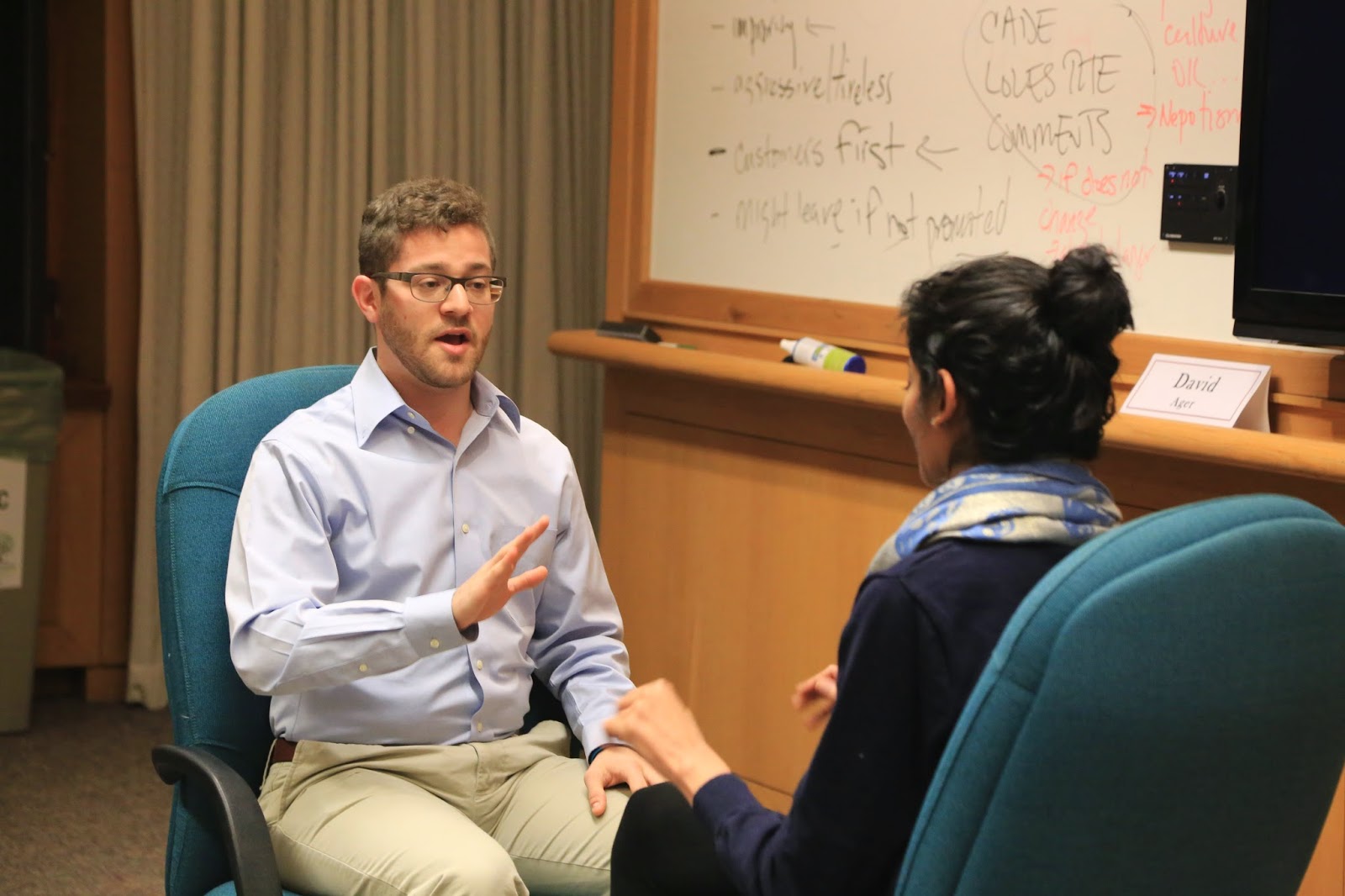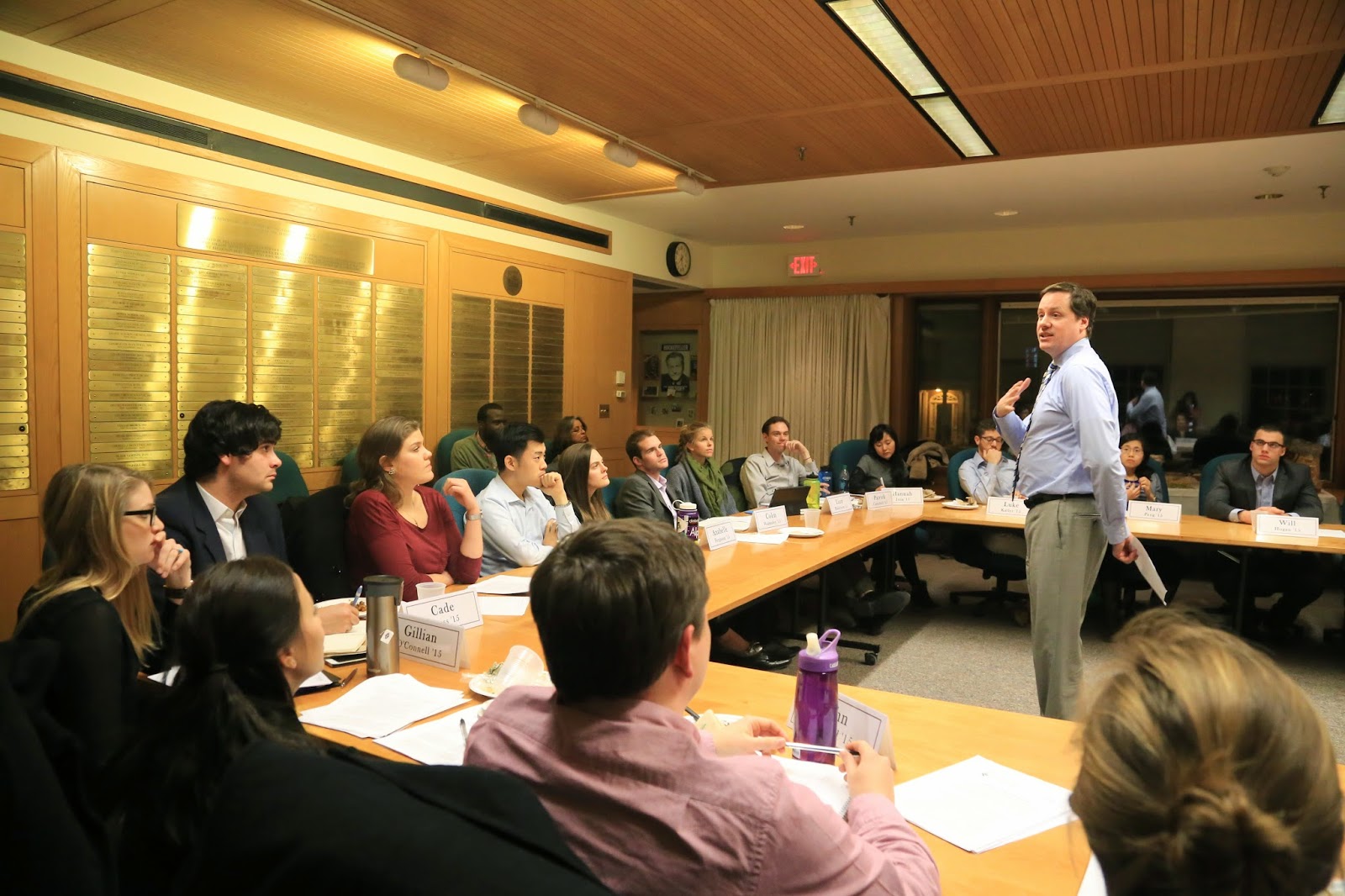- Public Policy
- Leadership
- Funding
- News & Events
- About the Center
Back to Top Nav
Back to Top Nav
Back to Top Nav
Back to Top Nav
This ongoing series explores sessions of the Rockefeller Leadership Fellows (RLF) program. RLF provides fellows with resources in leadership theories and practical skills. Selected their Junior Spring, these Seniors take part in the workshops, dinner discussions, and team-building exercises as they gain a better understanding of the qualities and responsibilities necessary for leaders and successful leadership styles.
Professor David Ager, a Senior Fellow in Harvard Business School’s Executive Education program, joined the 2014-2015 Rockefeller Leadership Fellows recently and exposed us to a business school case study to demonstrate challenges of management and the consequences that can follow from failing to manage people well.
 |
| Harvard Business School Senior Fellow David Ager lays out a complicated case study for the Rockefeller Leadership Fellows. Photo by May Nguyen '18. |
Ager brought dynamism to our examination of Harvard Business School’s Rob Parson case study, in which we take the perspective of a senior managing director (MD) at Morgan Stanley. That director hired Rob Parson (a pseudonym) to bring the bank’s Capital Market Services (CMS) success. Parson, an energetic and aggressive worker, was a figure the MD knew had been successful and so was implicitly promised a promotion if CMS made a turnaround. Parson produced that turnaround, but there were problems. At the same time, Morgan Stanley’s CEO John Mack had laid out his "One Firm" vision for the bank’s culture, emphasizing teamwork and respect. Parson’s style, which many of his coworkers found to be abrasive and volatile, was the antithesis of Mack’s vision. Yet the MD, whether out of optimism about Parson’s ability to change his behavior or a fear of disappointing Parson, was hands-off and did not seriously try to correct Parson’s behavior.
 |
| Two Rockefeller Leadership Fellows discuss a business school case study in a recent session. Photo by May Nguyen '18. |
The Fellows were thrown into the predicament at the time when the MD needed to decide whether to recommend Parson for a promotion. Here, Ager’s focus pushed us into recognizing the risks of promoting or deferring a recommendation for both the MD and the firm. Through this, we saw the potential for damage to the director’s reputation as fair and trustworthy and the possibility that Parson would leave the firm, dragging CMS back down as he exited. Yet we were also pushed to consider broader effects. Would Parson, if promoted, start to "play by the firm’s rules?" Or would the message that the firm’s internal rules do not apply to those who produce financial success generate significant discord? Perhaps most daunting was the possibility that through leading by example, Parson would end up developing a "toxic cell" within the firm or CMS that would refuse to follow the CEO’s One Firm vision.
 |
| David Ager pushes the Rockefeller Leadership Fellows to consider the nuances of the case study's situation. Photo by May Nguyen '18. |
Ager then pushed us to consider how we would tell Parson that he would not be recommended for promotion. In order to have that conversation constructively, especially when the subject may believe he or she has been succeeding, as Parson surely did, we need to be aware of the emotions that such a difficult conversation can induce before we have any hope of working to find a solution. Earlier in the process, however, a more direct, hands-on approach toward Parson and his negative behaviors likely would have produced positive change. Indeed, the real Parson stormed out of the room and hid for three days when he learned he would not be promoted. He then returned and was put under a different supervisor who would provide him with immediate feedback on negative behaviors. While a complete behavioral turnaround would have been fantasy, Parson made significant improvements and was promoted the following year.
As people who will be on both the receiving and giving end of difficult conversations about feedback and promotions, the Fellows are very grateful to Professor Ager for his energy in guiding us through the case study.
-Written by John Howard '15, 2014-2015 Rockefeller Leadership Fellow